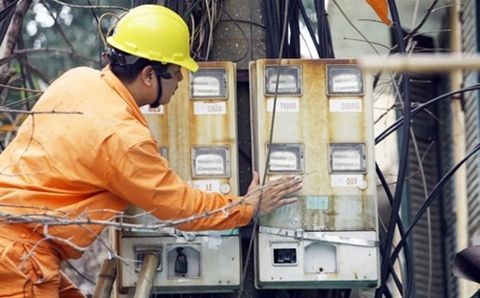EVN's prelude to huge losses to increase electricity prices?
EVN's General Director has just sadly announced that the group is suffering a huge loss of up to 16,800 billion VND, right after requesting an adjustment in electricity prices.
| RELATED NEWS |
|---|
Sad because of huge loss
At the conference to summarize the implementation of tasks in 2014 and deploy the plan for 2015 held on the morning of January 13, Mr. Pham Le Thanh, General Director of Vietnam Electricity Group (EVN) gave this figure.
Analyzing specific figures, Mr. Thanh said that with the production and business loss due to drought in the period of 2009-2010 of about 12,000 billion VND that has been handled by EVN, there is still about 8,800 billion VND in loss from exchange rate difference that has not been balanced.
 |
| EVN complains of huge losses after proposal to adjust electricity prices |
Combined with about 8,000 billion VND in new losses arising from increased coal prices, water resource tax increased from 2% to 4%, forest environmental fees, rural power grid costs... the total loss up to now of the "big guy" in the electricity industry is 16,800 billion VND.
"EVN cannot balance this loss yet, it is a huge challenge for the group in 2015" - the press quoted Mr. Thanh.
He also said that while waiting for the Government and the Ministry of Industry and Trade to consider the plan to adjust electricity prices that EVN has submitted, EVN must continue to optimize costs to increase productivity.
Asking for a price increase and the normal thing when buying electricity from China
Previously, at the press conference announcing the cost of electricity production and business in 2013 on December 30, 2014, organized by the Ministry of Industry and Trade and EVN, EVN Deputy General Director Dinh Quang Tri said that in 2014, although the electricity price did not increase, a series of costs were still "hanging" there.
Specifically, according to EVN's preliminary calculations, although the increased hydropower output structure has reduced costs by about VND 2,055 billion.
But in return, it must increase by 2,100 billion due to coal price adjustment, gas price on consumption is 1,114 billion, exchange rate fluctuations are 128 billion, water resource tax is 1,504 billion more, rural power grid cost is over 1,000 billion... Total is about 15,000 billion VND.
With that reality, EVN will have two options, either propose to increase electricity prices, or recommend some mechanisms to the Government.
However, according to Mr. Tri, EVN will propose the Government to apply some mechanisms, instead of proposing to increase electricity prices immediately.
Specifically, for the 8,800 billion loss due to exchange rate difference, according to Government regulations, this amount must be allocated in 2015, but EVN will ask for a further delay because this is only an accounting regime.
Along with that, some payment costs to Petro Vietnam due to increased gas prices will also be delayed.
In addition, EVN also has a little "capital in hand" which is more than 2,055 billion in reduced costs due to output structure.
“Up to this point, we have seen some of the above costs. Therefore, based on the actual figures above, the joint ministries will decide whether to increase or not in 2015,” said Mr. Tri.
Also at the press conference, Mr. Nguyen Anh Tuan, Director of the Electricity Regulatory Authority, said that Vietnam began signing contracts to buy electricity from China in 2004 via 110 KV and 220 KV lines.
Explaining this, Mr. Tuan said that in previous years, Vietnam's power sources were under construction and not yet put into operation; at the same time, there were very dry periods such as 2008 and 2010.
Meanwhile, the price of electricity imported from China is higher than some hydropower plants but much lower than coal-fired thermal power plants and gas turbines. Therefore, in drought years, the source of electricity imported from China is very valuable because without this source, EVN will certainly have to reduce electricity on a relatively large scale.
Mr. Tuan also said that in 2014, 2.29 billion KWh of electricity was imported from China and it is expected that in 2015 only 1.8 billion KWh will be imported, the current contract to import electricity from China will expire at the end of 2015.
Mr. Tri said that buying electricity from neighboring countries is "normal" to increase reserves in case the power system has problems, the power source is not guaranteed due to low water supply or the load growth is too fast in a number of years when newly built power sources have not been put into operation.
In addition to China, Vietnam also participates in the power grid connection program with countries in the region, especially the Mekong sub-region countries.
“Connecting the power grids of other countries makes the power system more reliable, reduces investment costs, increases available capacity, and reduces investment pressure. Although the Northern power grid can provide enough electricity, some low-voltage areas still have to use Chinese electricity because it is closer to Vietnam and the voltage is more stable,” Mr. Tri told Nguoi Lao Dong newspaper, adding that the policy is to maintain the grid connection once it is connected.
According to Dat Viet






